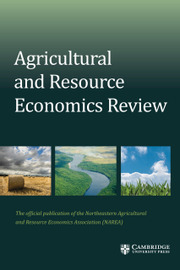Article contents
Achieving Environmental Objectives Under Reduced Domestic Agricultural Support and Trade Liberalization: An Empirical Application to Taiwan
Published online by Cambridge University Press: 15 September 2016
Abstract
We focus on rice policy reform required for Taiwan's admission to the WTO, and examine the effects, theoretically and empirically, of the re-instrumentation of domestic policy needed to achieve environmental objectives when both positive and negative environmental externalities exist. Policies that treat non-commodity attributes in agriculture as secondary to existing aims, such as income support, are unlikely to result in the desired supplies of environmental goods. Those supplies can be achieved at lower government and social costs using policy instruments to achieve environmental goals directly. Results are relatively insensitive to the social values assigned to environmental goods.
Keywords
- Type
- Contributed Papers
- Information
- Copyright
- Copyright © 2005 Northeastern Agricultural and Resource Economics Association
References
- 6
- Cited by


